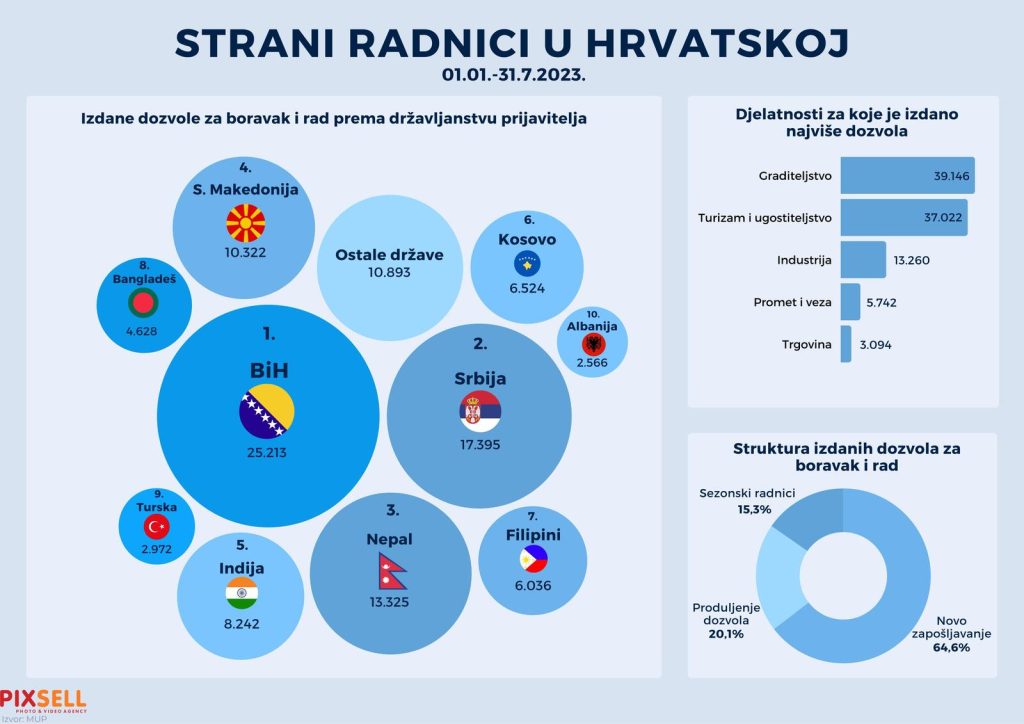May the 2nd, 2024 – Croatian employers have noted their difficulties in finding local staff who “want to work” as we approach the summer tourist season.
As Poslovni Dnevnik writes, Croatian employers in the tourism, hospitality and catering sector are expecting quite a lot from the spring and summer season. This is primarily due to announcements of good tourist demand and investments being made in overall quality. Despite that, they are plagued by the now “traditional” problems, from the lack of workers and tax burdens to unrealistically regulated working hours. This was pointed out by the president of the Association of Hospitality Activities within the Croatian Chamber of Commerce (HGK), Jelena Tabak.
“For restaurant owners and other such Croatian employers, 2024 could be the first business-normal and good year since the pandemic and all the restrictions they survived throughout that period. Although we can’t yet speak of a complete recovery, because many have taken on debt and it won’t be easy to make money for all expenses, restaurant owners are still hoping for a better season than last year. There’s been a lot of investment in facilities and supply, and we believe that demand will follow this,” said Tabak.
A noticeable increase in the quality and variety of the offer, but also in prices and wages
It is noticeable, added Tabak, that the quality and diversity of the overall hospitality and catering offer is increasing throughout Croatia. Facilities are being modernised and harmonised with gastronomic and similar trends. In addition, a lot of work is also being done on the sustainable and local food and drink offer in restaurants, taverns, bistros and other facilities. That’s all well and good, but the prices are also higher than they were last year.
The increase in prices ranges from about 10 to about 20 percent overall. There are also some facilities, especially restaurants and cafes, where they remain the same as last year. The costs for Croatian employers for their staff, are burdensome. Croatian employers typically find it difficult to come across staff, especially qualified ones. They’re demanding higher and higher wages, and those wages are currently rising more than the prices such facilities can charge.
There are more and more foreign workers in the catering and hospitality industry, especially in the kitchens…

“It’s becoming increasingly difficult to find local people who want to work in the hospitality industry. It seems that we’re moving in the direction of more and more foreigners working in these positions. In addition to salaries, other costs are also constantly rising, and the VAT rate in the hospitality industry is still among the highest in the entire EU. In order to be able to cover all costs, Croatian employers are being forced to choose whether to invest in their facilities or their people and their education. That is simply not sustainable hospitality,” commented Tabak.
There are, she believes, solutions for many situations, including for this one, but we need more political will. There also needs to be a much greater level of understanding of these types of economic activities at the national and especially local level of government.
“It’s as if the decision-makers forget about climate change and the scorching heat in Croatia during summer. They forget that tourists and local people actually only want to go out after 21:00 or 22:00, sit down somewhere, and then eat and drink something. The working hours are restaurants, bistros, taverns, cafes and other facilities with seats are usually set until midnight or until 01:00, which is just not in line with current demands,” explained Tabak.
She then referenced the most recent ridiculous example of a total lack of understanding from a city that relies heavily on tourism – Split.
Tabak noted that in competing countries across the Mediterranean, from Greece, Italy to Spain, France and others, working hours are longer into the night. Similarly to those countries, she believes that here in Croatia, restaurants would benefit from double working hours, i.e. after lunch, workers can go and take a break for a couple of hours.
The importance of policy makers’ agreement with croatian employers in this profession – a good example with tips for card payments

“Despite the problems and challenges in Croatia, you can work well and earn money in the hospitality industry. It was a good thing that the ministry managed to include restaurants for the first time for non-reimbursed sectoral state and EU grants. That said, lower VAT and other measures for levies and taxes would also help a lot,” emphasised Tabak.
A good example of such an agreement refers to waiter tips and the possibility introduced recently for guests to leave them even when paying by card. Tabak believes that the benefits of this new measure will be apparent this summer.











